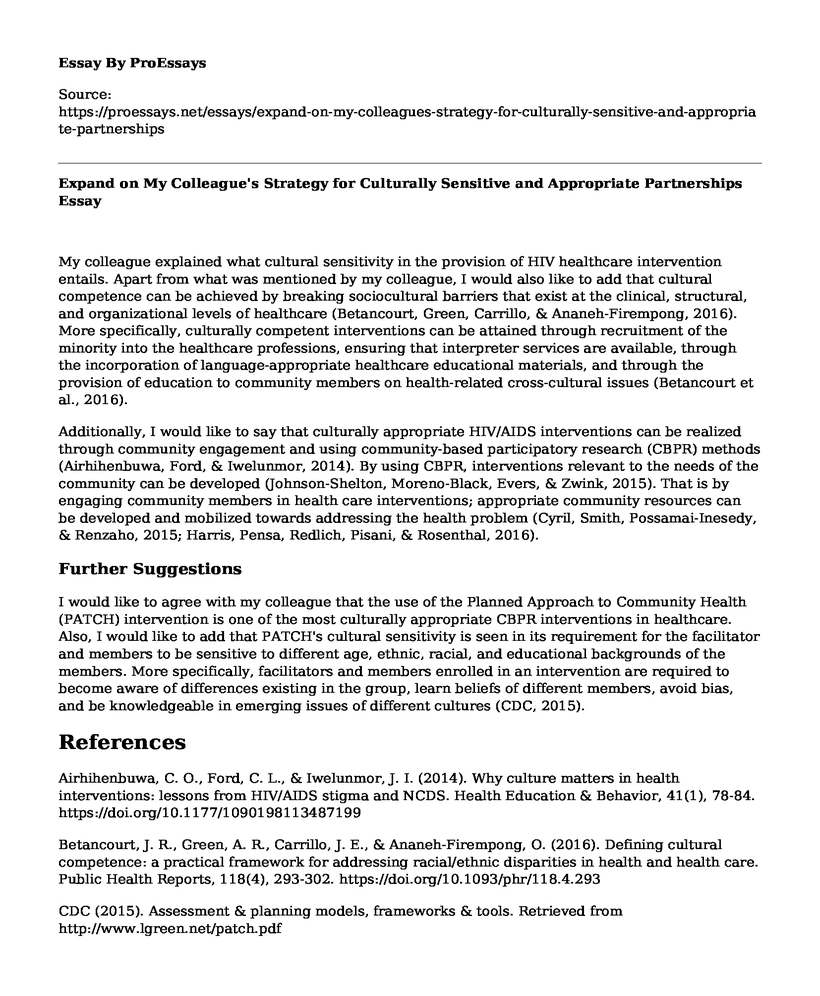My colleague explained what cultural sensitivity in the provision of HIV healthcare intervention entails. Apart from what was mentioned by my colleague, I would also like to add that cultural competence can be achieved by breaking sociocultural barriers that exist at the clinical, structural, and organizational levels of healthcare (Betancourt, Green, Carrillo, & Ananeh-Firempong, 2016). More specifically, culturally competent interventions can be attained through recruitment of the minority into the healthcare professions, ensuring that interpreter services are available, through the incorporation of language-appropriate healthcare educational materials, and through the provision of education to community members on health-related cross-cultural issues (Betancourt et al., 2016).
Additionally, I would like to say that culturally appropriate HIV/AIDS interventions can be realized through community engagement and using community-based participatory research (CBPR) methods (Airhihenbuwa, Ford, & Iwelunmor, 2014). By using CBPR, interventions relevant to the needs of the community can be developed (Johnson-Shelton, Moreno-Black, Evers, & Zwink, 2015). That is by engaging community members in health care interventions; appropriate community resources can be developed and mobilized towards addressing the health problem (Cyril, Smith, Possamai-Inesedy, & Renzaho, 2015; Harris, Pensa, Redlich, Pisani, & Rosenthal, 2016).
Further Suggestions
I would like to agree with my colleague that the use of the Planned Approach to Community Health (PATCH) intervention is one of the most culturally appropriate CBPR interventions in healthcare. Also, I would like to add that PATCH's cultural sensitivity is seen in its requirement for the facilitator and members to be sensitive to different age, ethnic, racial, and educational backgrounds of the members. More specifically, facilitators and members enrolled in an intervention are required to become aware of differences existing in the group, learn beliefs of different members, avoid bias, and be knowledgeable in emerging issues of different cultures (CDC, 2015).
References
Airhihenbuwa, C. O., Ford, C. L., & Iwelunmor, J. I. (2014). Why culture matters in health interventions: lessons from HIV/AIDS stigma and NCDS. Health Education & Behavior, 41(1), 78-84. https://doi.org/10.1177/1090198113487199
Betancourt, J. R., Green, A. R., Carrillo, J. E., & Ananeh-Firempong, O. (2016). Defining cultural competence: a practical framework for addressing racial/ethnic disparities in health and health care. Public Health Reports, 118(4), 293-302. https://doi.org/10.1093/phr/118.4.293
CDC (2015). Assessment & planning models, frameworks & tools. Retrieved from http://www.lgreen.net/patch.pdf
Cyril, S., Smith, B. J., Possamai-Inesedy, A., & Renzaho, A. M. N. (2015). Exploring the role of community engagement in improving the health of disadvantaged populations: a systematic review. Global Health Action, 8. https://doi.org/10.3402/gha.v8.29842
Harris, D. A., Pensa, M. A., Redlich, C. A., Pisani, M. A., & Rosenthal, M. S. (2016). Community-based participatory research is needed to address pulmonary health disparities. Annals of the American Thoracic Society, 13(8), 1231-1238. https://doi.org/10.1513/AnnalsATS.201601-054PS
Johnson-Shelton, D., Moreno-Black, G., Evers, C., & Zwink, N. (2015). A community-based participatory research approach for preventing childhood obesity: the communities and schools together project. Progress in Community Health Partnerships: Research, Education, and Action, 9(3), 351-361. https://doi.org/10.1353/cpr.2015.0056
Cite this page
Expand on My Colleague's Strategy for Culturally Sensitive and Appropriate Partnerships. (2022, Sep 22). Retrieved from https://proessays.net/essays/expand-on-my-colleagues-strategy-for-culturally-sensitive-and-appropriate-partnerships
If you are the original author of this essay and no longer wish to have it published on the ProEssays website, please click below to request its removal:
- Licensed Practicing Nursing Career Plan Example
- Research Paper Example on AAMN - American Assembly for Men in Nursing
- Drug and Drug Abuse Essay Example
- Pathophysiology and Prognosis of Leukemia in Children Paper Example
- Domestic Worker-Employer Relationship Paper Example
- Pulmonary Embolism: A Common Cause of Mortality in Hospitals - Research Paper
- Production and Cost Analysis in the Fast Food Industry Paper







